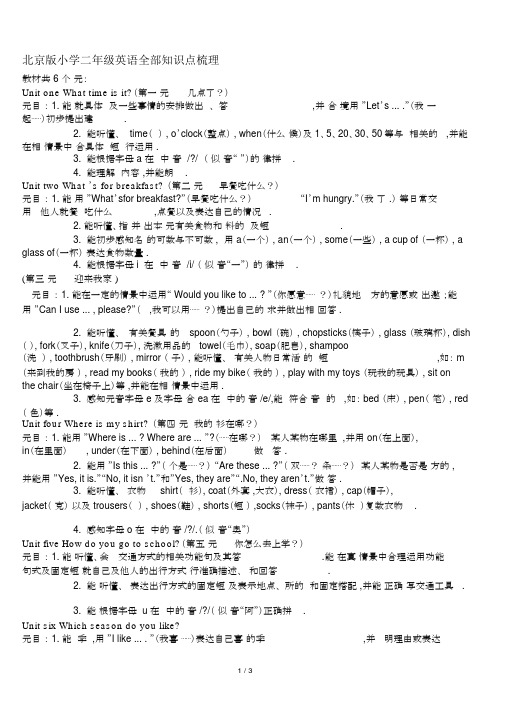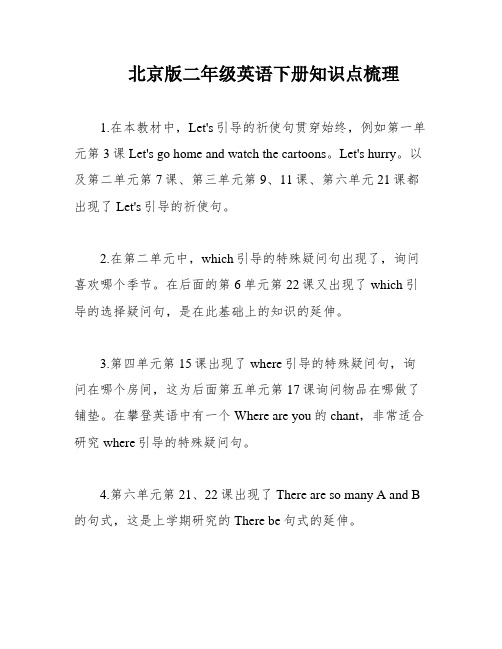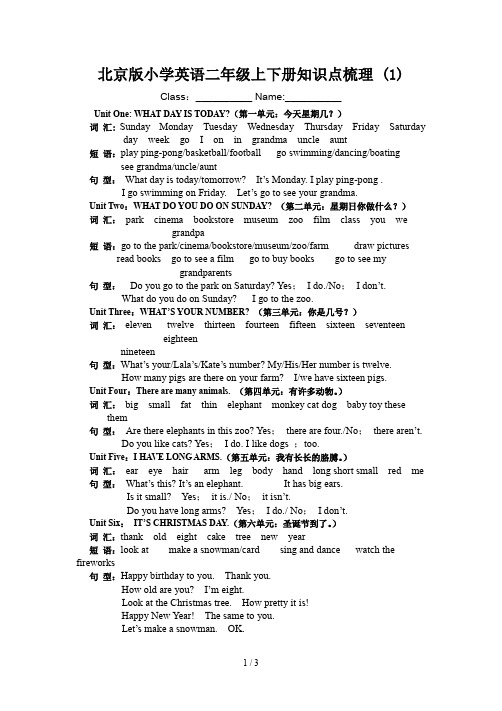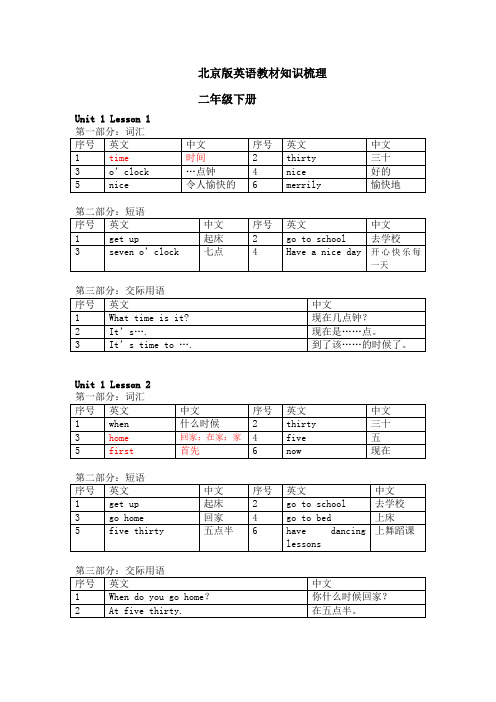北京版小学二年级的的英语全部知识点梳理.doc
北京小学二年级英语知识点

北京⼩学⼆年级英语知识点英语学习是为了⾯对将来的全球化世界所必须要坚持的学习。
尤其随着中国的进⼀步发展,世界各地的⼈都会来中国从事,掌握英语可以让你在将来的交流中先于⼀步。
以下是⼩编整理的相关资料,希望帮助到您。
北京⼩学⼆年级英语知识点词汇学习:bin垃圾箱 park公园 road路 building⼤楼Shanghai上海 apple苹果 bird鸟 clean弄⼲净sweep扫 desk书桌 floor地板 where哪⾥live居住 love爱 use⽤ every每⼀个day天 keep保持复习巩固:please请 classroom教室 bicycle⾃⾏车 slide滑梯swing秋千 doll娃娃 ball球 balloon⽓球 point to指向词汇拓展:home家 the Bund外滩 tower塔举⼀反三:1.上海版⼩学英语⼆年级下册第⼀单元知识点:Clean the bicylce, please. 请把⾃⾏车弄⼲净。
2.Clean the classroom, please. 请把教室弄⼲净。
3.Sweep the classroom, please. 请把教室扫⼀扫。
4.Sweep the road, please. 请把马路扫⼀扫。
5.Where do you live? I live in Songjiang. I love Songjiang.你居住在哪⾥? 我居住在松江。
我爱松江。
6.Where do you live? I live in Jiading. I love Jiading.你居住在哪⾥? 我居住在嘉定。
我爱嘉定。
7.This is my mother. She is a nurse. I love my mother.这是你的母亲。
她是⼀名护⼠。
我爱我的母亲8.That is my father. He is a postman. I love my father.那是我的⽗亲。
北京版二年级全册英语知识点

二年级英语上册知识点总结Unit 11.句子:功能句型:1)This panda is old and fat. That monkey is young and thin.2)Do you like cats? Yes, I do. I like dogs ,too.3)There are so many toys here.These toys are so lovely.课文重点句:1) They are so cute.2) Look at the four baby cats.3) Look at those animals.2.语法点:1) be + 形容词2) Do you like…? Yes, I d o. 3) there are…4) 名词复数---- cats, dogs… 5) 冠词the3.词汇:动物:panda, monkey, bear, zebra, kangaroo, giraffe, pig, sheep, horse, donkey, rooster, hen, turkey, goose, dog, cat, tiger, elephant形容词:old, young, fat, thin,cute,lovely , cool数词:three, four, five, nine, eight,动词:go, see, look 4.语音:a, ey, ee, o, i ,er,Unit 21 功能句式:What color is your hair? It’s white. I have short arms and small hands. I have long arms but short legs. I am tall. 2语法点:a.名词的复数形式, legs arms, ears, eyes,不规则变化foot---feet。
b. 介词and和but。
最新北京版小学二年级英语全部知识点梳理.docx

北京版小学二年级英语全部知识点梳理教材共 6 个元:Unit one What time is it?(第一元几点了?)元目: 1. 能就具体及一些事情的安排做出、答,并合境用”Let’s ... .”(我一起⋯⋯)初步提出建.2.能听懂、 time() , o’clock(整点) , when(什么候)及 1、5、20、30、50等与相关的 ,并能在相情景中合具体短行运用 .3.能根据字母 a 在中音 /?/ (似音“ ”)的律拼 .4.能理解内容 ,并能朗 .Unit two What ’s for breakfast? (第二元早餐吃什么?)元目: 1. 能用”What’sfor breakfast?”(早餐吃什么?)“I’m hungry.”(我了.)等日常交用他人就餐吃什么,点餐以及表达自己的情况.2. 能听懂、指并出本元有关食物和料的及短.3.能初步感知名的可数与不可数 ,用 a(一个) , an(一个) , some(一些) , a cup of (一杯) , a glass of(一杯)表达食物数量 .4.能根据字母 i 在中音 /i/ (似音“一”)的律拼 .(第三元迎来我家)元目: 1. 能在一定的情景中运用“ Would you like to ... ? ”(你愿意⋯⋯?)礼貌地方的意愿或出邀;能用”Can I use ... , please?”( ,我可以用⋯⋯?)提出自己的求并做出相回答 .2.能听懂、有关餐具的 spoon(勺子) , bowl (碗) , chopsticks(筷子) , glass (玻璃杯), dish (), fork(叉子), knife(刀子), 洗漱用品的 towel(毛巾), soap(肥皂), shampoo(洗) , toothbrush(牙刷) , mirror (子) , 能听懂、有关人物日常活的短,如: m (来到我的房) , read my books(我的) , ride my bike(我的) , play with my toys (玩我的玩具) , sit on the chair(坐在椅子上)等 ,并能在相情景中运用 .3.感知元音字母 e 及字母合 ea 在中的音 /e/,能符合音的 ,如: bed (床) , pen(笔) , red (色)等 .Unit four Where is my shirt? (第四元我的衫在哪?)元目: 1. 能用”Where is ... ? Where are ... ”?(⋯⋯在哪?)某人某物在哪里 ,并用 on(在上面),in(在里面), under(在下面) , behind(在后面)做答.2.能用”Is this ... ?”(个是⋯⋯?)“Are these ... ?”(双⋯⋯?条⋯⋯?)某人某物是否是方的 ,并能用”Yes, it is.”“No, it isn ’t.”和”Yes, they are”“.No, they aren’t.”做答 .3.能听懂、衣物 shirt(衫), coat(外套 ,大衣), dress(衣裙) , cap(帽子),jacket(克)以及 trousers() , shoes(鞋) , shorts(短) ,socks(袜子) , pants(休)复数衣物 .4.感知字母 o 在中的音 /?/.(似音“奥”)Unit five How do you go to school?(第五元你怎么去上学?)元目: 1. 能听懂、会交通方式的相关功能句及其答.能在真情景中合理运用功能句式及固定短就自己及他人的出行方式行准确描述、和回答.2.能听懂、表达出行方式的固定短及表示地点、所的和固定搭配 ,并能正确写交通工具 .3.能根据字母 u 在中的音 /?/(似音“阿”)正确拼 .Unit six Which season do you like?元目: 1. 能季 ,用”I like ... . ”(我喜⋯⋯)表达自己喜的季,并明理由或表达常做的事情 .2.能听懂、指认并读出表达四季的词和表达活动的动词短语 ,如: plant trees(植树) , go camping(去露营) , pick apples(摘苹果) , play in the snow(在雪里玩) .3.感受字母组合 ar 在单词中的读音 /a:/(类似发音“啊”)Unit Function Language and KeyLetters and sounds structure vocabularyUnit one Talking about time-What time is it?thirty to fifty a: bad, bag, cat, jam, van,-It ’s seven o’clock.o’clock apple, flag, glad, panda,-When do you go home?go home, get up,happy, hand-At five thirty.go to school, go to-What time is it?bed, go to the-It ’s nine twenty. It ’s drawing lessons,time to go to bed.watch the cartoonsUnit two Having meals-What ’s for breakfast?bread, milk, eggs,i: fish, dish, big, gift, river,-We have bread, milk,fruits, soy milk,king, six, film, it, singeggs, and fruits.noodles, fish, fried-Can I have fish and rice, a hamburger,rice, please? a hot dog, an egg,-Yes. Here you are.an orange, a glass-I’m hungry/thirsty.of water/juice/soy-Have an orange/ a glass milk, a cup of teaof water.Unit three Unit four Invitation and e: bed, pen, red, pet, get, asking for-Yes, we’d love to.the spoon,the neck, leg, desk, vest, jello, permission-Would you like to use glasses, the bowl,yellow, egg, elephant,the glasses?the chopsticks, the ea:head, bread-No, thank you.bathroom, the-Can I use the towel, the soap,bathroom, please?the shampoo, the-Sure. / Sorry you can ’t.toothpaste. Talking about-Where is my shirt?coat, cap, dress,o: box, dog, ox, fox, long, where the things-It ’s under the bed.shirt, jacket,clock, mop, top, hot are,-Is this your jacket?football, watchUnit five Unit six . Asking and-Yes, it is. / No, it isn ’t.shorts, shoes,telling ownership-Are these your trousers, sockstrousers?behind the sofa,-Yes, they are. / No,under the bed, inthey are not.the box,on the deskAsking and telling-How do you go to school, the u: hut, cup, lunch, nut, the way to travel school?cinema, the zoo duck, lucky, bus-I go to school by bus.by bus / bike / car-How does your dad go/ taxi / subway, onto work?foot-He goes to work by car.-Yes, he does./No, hedoesn’t.Talking about-How many seasons are season, year, hour ar: car, park, star, arm, seasons there in a year?spring, summer,card, party-There are four.autumn, winter-Do you like winter?go camping, play-Yes, I do. / No, I don ’t in the snow, fly alike winter.kite, pick apples-Which season do youlike?-I like spring. I can fly akite.。
北京版小学英语二年级上下册知识点梳理

北京版小学英语二年级上下册知识点梳理北京版小学英语二年级上册知识点梳理Class:__________ Name:__________Unit One: WHAT DAY IS TODAY?(第一单元:今天星期几?)词汇: Sunday Monday Tuesday Wednesday Thursday Friday Saturdayday week go I on in grandma uncle aunt短语:play ping-pong/basketball/football goswimming/dancing/boatingsee grandma/uncle/aunt句型:What day is today/tomorrow? It’s Monday. I play ping-pong .I go swimming on Friday. Let’s go to see your grandma.Unit Two:WHAT DO YOU DO ON SUNDAY? (第二单元:星期日你做什么?)词汇: park cinema bookstore museum zoo film class you we grandpa短语:go to the park/cinema/bookstore/museum/zoo/farm drawpicturesread books go to see a film go to buy books go to see my grandparents句型:Do you go to the park on Saturday? Yes, I do./No, I don’t.What do you do on Sunday? I go to the zoo.Unit Three:WHAT’S YOUR NUMBER? (第三单元:你是几号?)词汇:eleven twelve thirteen fourteen fifteen sixteenseventeen eighteennineteen句型:What’s your/Lala’s/Kate’s number? My/His/Her number is twelve.How many pigs are there on your farm? I/we have sixteen pigs.Unit Four:There are many animals. (第四单元:有许多动物。
北京版英语教材二年级上知识梳理

v1.0可编写可改正二年级上词汇及句型Unit one What day is today话题:礼拜与活动:礼拜: Weekends( Sunday, Saturday), weekdays(Monday, Tuesday, Wednesday, Thursday, Friday )打球: play ping-pang/⋯,活:go swimming/⋯ .拜探望某人: go to see my grandparents/ uncle/ aunt/ brother/ sister.句型: 1. What day is today今日礼拜几--It’s Tuesday. I play ping-pang today.It’s Saturday. Let’ s go to see your grandma.2. What day is tomorrow 明日礼拜几— It ’ s Thursday. I go swimming on Thursday.注意:活不一样,表达方式不一样go to see ⋯ , play⋯, go⋯.礼拜的首字母大写。
v1.0可编写可改正Unit two What do you do on Sunday:活:去某地 go to the park/ cinema/ bookstore/ museum(zoo, farm)以及表示活的短表达。
句型:1. Do you go to the park on Saturday , Kate--Yes, I do./ No, Idon’ t.Do you go to see your grandparents on Saturday, Kate2. What do you do on Sunday--I draw pictures .(I go to the museum. )注意: 1.注意活表达的固定搭配go to the zoo, read books, go to see afilm ⋯ .2.句子划部分能够行替v1.0可编写可改正3.在礼拜几用 on 表示, on Monday, on Wednesday ⋯4.一致性: do you 提,回答就是 do 和 don’t.Unit three What’s your number:数字,方号v1.0可编写可改正:1-20 one, two, three, four, five, six, seven, eight, nine, ten,eleven, twelve , thirteen, fourteen, fifteen, sixteen, seventeen,eighteen, nineteen,twenty . ( 十几尾— teen,几十尾–ty,划分twelve12,twenty20)句型:1. What ’s your number --My number is twelve.Wha t ’ s his number His number is eleven. (他的)What’ s her number Her number is twenty.(她的)2. How many pigs do you have on your farm--I have sixteen pigs (on my farm). (复数)How many girls / boys do you have in your class--Wehave nineteen girls/boys.注意 :名复数化,数目=1数表达,数目大于等于 2 复数表达,加s 或 es。
北京版二年级英语下册知识点梳理

北京版二年级英语下册知识点梳理1.在本教材中,Let's引导的祈使句贯穿始终,例如第一单元第3课Let's go home and watch the cartoons。
Let's hurry。
以及第二单元第7课、第三单元第9、11课、第六单元21课都出现了Let's引导的祈使句。
2.在第二单元中,which引导的特殊疑问句出现了,询问喜欢哪个季节。
在后面的第6单元第22课又出现了which引导的选择疑问句,是在此基础上的知识的延伸。
3.第四单元第15课出现了where引导的特殊疑问句,询问在哪个房间,这为后面第五单元第17课询问物品在哪做了铺垫。
在攀登英语中有一个Where are you的chant,非常适合研究where引导的特殊疑问句。
4.第六单元第21、22课出现了There are so many A and B 的句式,这是上学期研究的There be句式的延伸。
5.第三单元第10课出现了Can I use…的句式,为后面第四单元第14课Can you give me…?打下了基础。
重点:1.本教材中的四会、三会单词分类包括:季节(夏天、冬天、春天、秋天)、自然界(花、草、叶子/树叶、天空、云)、家居(房间、卧室、浴室、厨房、客厅)、家居用品(桌子、椅子、电话、床、沙发、电脑、牙刷、肥皂、牙膏、洗发水、筷子、碗、刀、冰箱)、餐饮(早餐、午餐、晚餐、牛奶、茶、果汁、咖啡、豆浆、鸡蛋、米饭、鱼、饼干、豆腐、肉、面条、面包)、水果(橙子)和蔬菜。
2.重点词汇包括四会、三会单词,需要注意单词的拼写和发音。
3.句型方面,需要掌握Let's引导的祈使句、which引导的特殊疑问句、where引导的特殊疑问句、There are so many A and B的句式以及Can I use…和Can you give me…的句式。
4.在研究过程中,可以通过chant、歌曲、游戏等多种形式进行练,提高研究效果。
北京版小学英语二年级上下册知识点梳理 (1)

北京版小学英语二年级上下册知识点梳理 (1)Class:__________ Name:__________Unit One: WHAT DAY IS TODAY?(第一单元:今天星期几?)词汇: Sunday Monday Tuesday Wednesday Thursday Friday Saturday day week go I on in grandma uncle aunt短语:play ping-pong/basketball/football go swimming/dancing/boating see grandma/uncle/aunt句型:What day is today/tomorrow? It’s Monday. I play ping-pong .I go swimming on Friday. Let’s go to see your grandma.Unit Two:WHAT DO YOU DO ON SUNDAY? (第二单元:星期日你做什么?)词汇:park cinema bookstore museum zoo film class you wegrandpa短语:go to the park/cinema/bookstore/museum/zoo/farm draw pictures read books go to see a film go to buy books go to see mygrandparents句型:Do you go to the park on Saturday? Yes;I do./No;I don’t.What do you do on Sunday? I go to the zoo.Unit Three:WHAT’S YOUR NUMBER? (第三单元:你是几号?)词汇:eleven twelve thirteen fourteen fifteen sixteen seventeeneighteennineteen句型:What’s your/Lala’s/Kate’s number? My/His/Her number is twelve.How many pigs are there on your farm? I/we have sixteen pigs.Unit Four:There are many animals. (第四单元:有许多动物。
北京课改版小学二年级下册-英语重点知识汇总梳理

2. No, thank you.
不用了,谢谢。
Unit3 Lesson11第一部分:单词
1
bathroom
卫生间
2
call
打电话
3
phone
电话
4
towel
毛巾
5
shampoo
洗发水
6
soap
香皂
7
toothpaste
牙膏
8
want
想要
第二部分:短语
1
over there
在那边
中文
序号
英文
中文
1
dad
爸爸
2
for
为……所需
3
bread
面包
4
milk
牛奶
5
egg
鸡蛋
6
an
一,一个
7
fruits
水果
8
soy milk
豆浆
9
noodles
面条
10
baozi
包子
第二部分:短语
序号
英文
中文
序号
英文
中文
1
havebreakfast
吃早餐
2
have bread
吃面包
3
have milk
在床底下
4
behind the sofa
在沙发后
第三部分:句型
1. Where is my shirt?
我的衬衫在哪?
2. It’s under the bed.
在床底下。
Unit4 Lesson14第一部分:单词
1
this
- 1、下载文档前请自行甄别文档内容的完整性,平台不提供额外的编辑、内容补充、找答案等附加服务。
- 2、"仅部分预览"的文档,不可在线预览部分如存在完整性等问题,可反馈申请退款(可完整预览的文档不适用该条件!)。
- 3、如文档侵犯您的权益,请联系客服反馈,我们会尽快为您处理(人工客服工作时间:9:00-18:30)。
北京版小学二年级英语下册(一年级起点)知识点梳理教材共 6 个单元:Unit one What time is it?(第一单元几点了?)单元目标: 1. 能够就具体时间及一些事情的安排做出询问、应答,并结合语境用” Let ’s ... . ”(我们一起)初步提出建议。
2. 能听懂、认读 time (时间) , o’clock (整点) , when(什么时候)及 1、5、20、30、50 等与时间相关的单词,并能在相应情景中结合具体动词短语进行运用。
3. 能根据字母 a 在单词中发音为 /?/ (类似发音“爱”)的规律拼读单词。
4. 能理解对话内容,并能朗读对话。
Unit two What ’s for breakfast?(第二单元早餐吃什么?)单元目标: 1. 能够用” What’s for breakfast? ”(早餐吃什么?)“I ’m hungry. ”(我饿了。
)等日常交际用语询问他人就餐时间吃什么,点餐以及表达自己的情况。
2.能听懂、指认并读出本单元有关食物和饮料的单词及短语。
3.能初步感知名词的可数与不可数,尝试用 a(一个) , an(一个) , some(一些) , a cup of (一杯) , a glass of(一杯)表达食物数量。
4.能根据字母 i 在单词中发音为 /i/ (类似发音“一”)的规律拼读单词。
单元目标: 1.能在一定的情景中运用“Would you like to ... ?”(你愿意吗?)礼貌地询问对方的意愿或发出邀请;能用” Can I use ... , please? ”(请问,我可以用吗?)提出自己的请求并做出相应回答。
2.能听懂、认读有关餐具类的单词 spoon(勺子), bowl(碗), chopsticks (筷子), glass (玻璃杯) , dish(盘), fork(叉子), knife(刀子),洗漱用品的单词towel (毛巾) , soap (肥皂) , shampoo (洗发剂) , toothbrush(牙刷), mirror(镜子),能听懂、认读有关人物日常活动的动词短语,如:come to my room(来到我的房间) , read my books (读我的书) , ride my bike (骑我的车) , play with my toys(玩我的玩具), sit on the chair(坐在椅子上)等,并能在相应情景中运用。
3.感知元音字母 e 及字母组合 ea 在单词中的读音 /e/ ,能认读符合语音规则的单词,如:bed(床) , pen (钢笔) , red (红色)等。
Unit four Where is my shirt?(第四单元我的衬衫在哪?)单元目标: 1.能用” Where is ... ? Where are ... ?”(在哪?)询问某人某物在哪里,并用 on(在上面) , in(在里面), under(在下面), behind(在后面)做简单应答。
2.能用” Is this ... ?” (这个是?)“Are these ... ?” (这双?这条?)询问某人某物是否是对方的,并能用”Yes, it is. ” “No, it isn ’ t. ”和” Yes, they are. ” “No, they aren’t.”做应答。
3.能听懂、认读衣物类单词 shirt (衬衫) , coat (外套,大衣) , dress (连衣裙) , cap (帽子) , jacket (夹克)以及 trousers (长裤) , shoes(鞋) , shorts (短裤) ,socks (袜子) , pants (休闲裤)复数衣物类单词。
4.感知字母 o 在单词中的读音 /?/. (类似发音“奥”)Unit five How do you go to school?(第五单元你怎么去上学?)单元目标: 1. 能够听懂、会说询问交通方式的相关功能句及其答语。
能够在真实情景中合理运用功能句式及固定短语就自己及他人的出行方式进行准确描述、询问和回答。
2.能够听懂、认读表达出行方式的固定短语及表示地点、场所的词汇和固定搭配,并能够正确书写交通工具词汇。
3.能够根据字母 u 在单词中的发音 /?/ (类似发音“阿”)正确拼读单词。
Unit six Which season do you like?单元目标: 1. 能谈论季节,用” I like ... . ”(我喜欢)表达自己喜爱的季节,并简单说明理由或表达常做的事情。
2.能听懂、指认并读出表达四季的词和表达活动的动词短语,如:plant trees (植树) ,go camping (去露营) , pick apples(摘苹果), play in the snow(在雪里玩).3.感受字母组合 ar 在单词中的读音 /a:/ (类似发音“啊”)Unit Function Language and KeyLetters and sounds structure vocabularyUnit one Talking about -What time is it? thirty to fifty a: bad, bag, cat, jam, time -It ’ s seven o’ clock van, apple, flag, glad,o’ clock. go home, get up, panda, happy, hand-When do you go home? go to school, go-At five thirty. to bed, go to the-What time is it? drawing-It ’ s nine twenty. lessons, watchIt ’ s time to go to the cartoonsbed.Unit two Unit three Having meals -What ’ s for bread, milk, i: fish, dish, big,breakfast? eggs, fruits, gift, river, king, six,-We have bread, milk, soy milk, film, it, singeggs, and fruits. noodles, fish,-Can I have fish and fried rice, arice, please? hamburger, a hot-Yes. Here you are. dog, an egg, an-I ’ m orange, a glasshungry/thirsty. of-Have an orange/ a water/juice/soyglass of water. milk, a cup ofteaInvitation and -Would you like to come to my room, e: bed, pen, red, pet, asking for come to my room? read my books, get, neck, leg, desk, permission -Yes, we ’ d love to. ride my bike, vest, jello, yellow,-Would you like to play with my egg, elephant,use the glasses? toys ea:head, bread-No, thank you. the spoon,the-Can I use the glasses, thebathroom, please? bowl, the-Sure. / Sorry you chopsticks, thecan’ t.bathroom, thetowel, the soap,the shampoo, thetoothpasteUnit four Unit five Unit six . Talking about -Where is my shirt?where the things -It ’ s under the bed.are, -Is this your jacket?. Asking and -Yes, it is. / No, ittelling isn ’ t.ownership -Are these yourtrousers?-Yes, they are. / No,they are not.Asking and-How do you go totelling the way school?to travel-I go to school bybus.-How does your dad goto work?-He goes to work bycar.-Does he come bytaxi?-Yes, h e does./No, hedoesn’ t.Talking about-How many seasons areseasons there in a year?-There are four.-Do you like winter?-Yes, I do. / No, Idon’ t like winter.-Which season do youlike?coat, cap, o: box, dog, ox, fox,dress, shirt, long, clock, mop, top,jacket, hotfootball, watchshorts, shoes,trousers, socksbehind the sofa,under the bed,in the box,on the deskschool, the u: hut, cup, lunch, nut,cinema, the zoo duck, lucky, busby bus / bike /car / taxi /subway, on footcome / go to thepark / go to thehospitalseason, year,ar: car, park, star,hour arm, card, partyspring, summer,autumn, wintergo camping, playin the snow, flya kite, pickapples-I like spring. I can fly a kite.。
